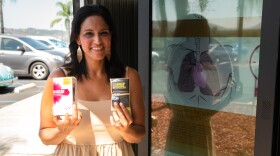



Ken Stern, NPR's chief executive officer, visited Iraq this month to check on NPR's Baghdad bureau. Following is an entry from his Reporter's Notebook.
I went to Baghdad to see how our reporters live, to understand what it means to cover this most important, demanding and dangerous of stories.
I ended up walking a little further than expected in Annie Garrels' shoes, into a five-hour embed hastily proposed and produced by the U.S. Army.
It was an inspection of three Baghdad markets — battlegrounds that insurgents attack and that U.S. forces try to secure.
You can buy just about anything you might need in Baghdad's markets: clothing, spices, curdled yogurt, knock-off watches, power tools, and cell phones with ridiculous ring tones.
Until recently, the Doura market was an insurgent stronghold in this Sunni neighborhood. Now the market is coming back — protected by blast walls in every direction and troops under the command of U.S. Army Maj. General Joseph Fil.
"We do not presume for a moment that this is going to stop suicide bombers," Fil says. "But what it'll do is it'll make them really work hard to get in here."
As we dismount, I watch closely for the reception from Iraqis in the market. We're greeted by a range of looks, some friendly, some hard. But even some of the hardest looks melt when Gen. Fil wades into the crowd like a small town politician trolling for votes.
"Well, I'm very happy that your business is going well," he tells a shopkeeper. "Congratulations," Fil says, adding in Arabic: "I wish you great success."
In early February, a truck bombing at Baghdad's Rasafa market killed at least 135 people. A month later, I saw rubble from that blast still smoldering. But even against this backdrop of destruction, the market has blossomed again, every stall occupied, every spot taken.
If you ignore the cordon of soldiers and hovering Apache helicopters, the market seems almost normal: music blares from the CD stalls, push carts full of carpets roll up the street, and hawkers pitch their wares. For me, it is a powerful and surprising picture of people carrying on with business as usual in a city where nothing is usual anymore.
Copyright 2022 NPR. To see more, visit https://www.npr.org. 9(MDAzMjM2NDYzMDEyMzc1Njk5NjAxNzY3OQ001))






